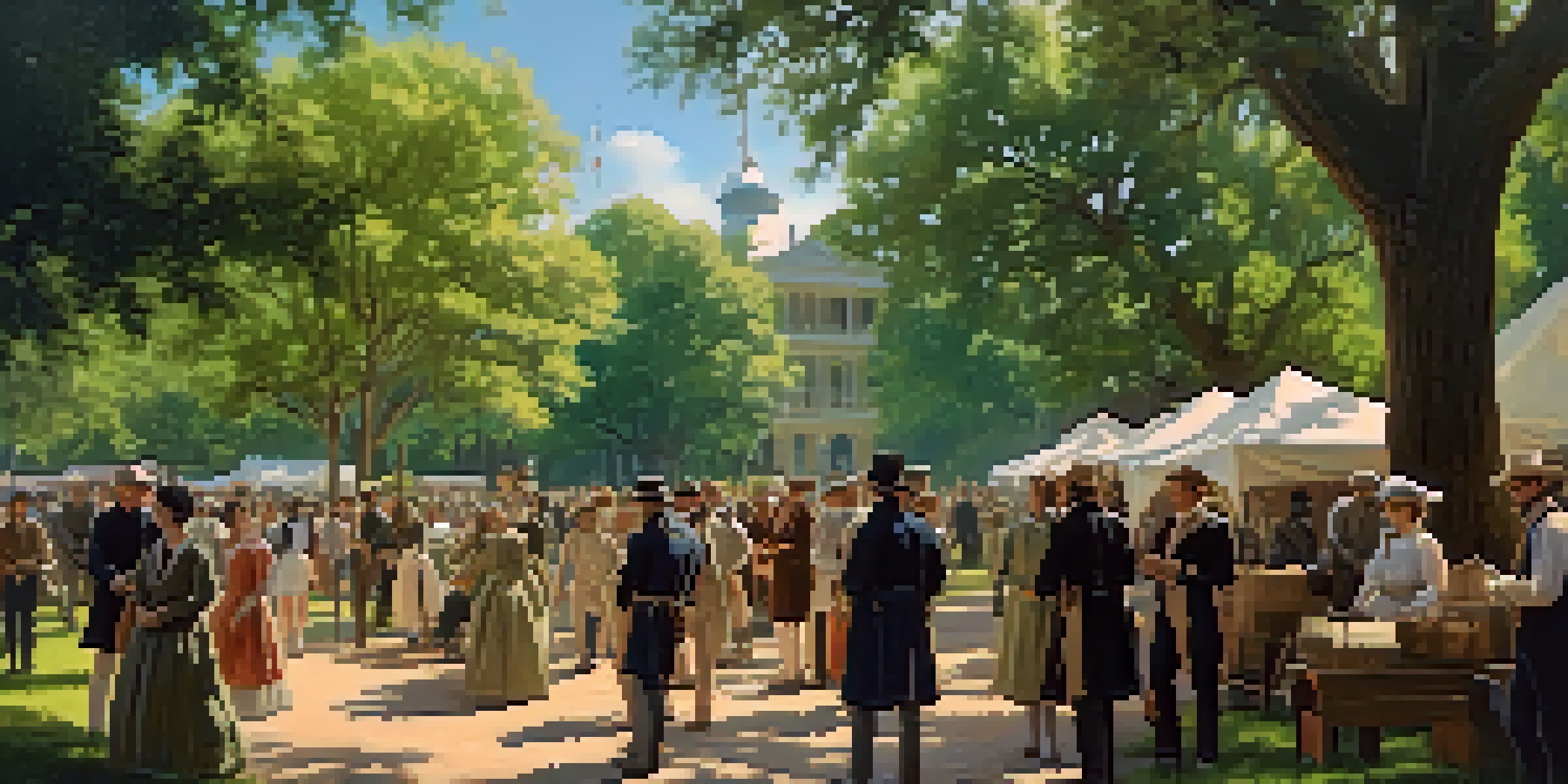The Role of Historical Societies in Houston's Cultural Heritage

Understanding the Role of Historical Societies in Houston
Historical societies play a pivotal role in preserving the rich tapestry of Houston's cultural heritage. These organizations serve as guardians of history, collecting artifacts, documents, and stories that reflect the city's diverse past. By showcasing these elements, historical societies help the community connect with its roots and understand the evolution of its identity.
History is not a burden on the memory but an illumination of the spirit.
In Houston, various historical societies focus on unique aspects of the city's heritage, from its founding in 1836 to its rapid growth in the oil and space industries. This specialization allows them to cater to different interests, providing a comprehensive understanding of Houston's multifaceted history. They often collaborate with local museums, schools, and community groups to enhance their outreach and educational efforts.
Moreover, these societies are essential in fostering a sense of pride among residents. By celebrating local history through events, exhibitions, and publications, they encourage citizens to appreciate the stories that have shaped their community. This sense of belonging is crucial in a city as diverse as Houston, where different cultures contribute to an ever-evolving narrative.
Key Historical Societies in Houston and Their Contributions
Houston is home to several notable historical societies, each contributing uniquely to the preservation of its cultural heritage. For instance, the Houston Historical Society focuses on the city's broader history, while the African American Library at the Gregory School highlights the contributions of African Americans throughout Houston's development. Each society plays a vital role in ensuring that diverse narratives are not just remembered but celebrated.

The Heritage Society, located in Sam Houston Park, provides a glimpse into 19th-century life in Houston through its collection of historic buildings. By preserving these structures, they offer residents and visitors alike a chance to experience the past firsthand. This immersive approach helps bridge the gap between history and contemporary life, creating a tangible connection to the city's roots.
Preserving Houston's Cultural Heritage
Historical societies are essential in safeguarding Houston's diverse history through the collection and exhibition of artifacts and stories.
Another key player is the San Jacinto Museum of History, which commemorates the pivotal Battle of San Jacinto. Their commitment to educating the public about this significant event in Texas history fosters a deeper understanding of the state's heritage. These societies work together, often supporting each other's initiatives, ensuring that Houston's cultural landscape remains vibrant and diverse.
Educational Programs Offered by Historical Societies
One of the significant impacts of historical societies in Houston is their commitment to education. Many societies offer workshops, lectures, and guided tours that cater to various age groups, making history accessible and engaging for everyone. These programs often focus on specific themes, such as the contributions of local communities or significant historical events, allowing participants to dive deeper into the city's past.
The past is never dead. It's not even past.
Schools frequently partner with these societies to enhance their curriculum, providing students with hands-on experiences that bring history to life. For example, field trips to historic sites or participation in reenactments can ignite a passion for learning that traditional classroom settings might not achieve. This collaboration promotes a lifelong appreciation for history among younger generations.
Additionally, virtual programs have gained popularity, particularly in recent years. These online offerings allow individuals from all over to engage with Houston's history, breaking down geographical barriers. By utilizing technology, historical societies can reach a wider audience, making educational resources available to those who may not be able to visit in person.
Community Engagement and Outreach Initiatives
Community engagement is a cornerstone of the work done by historical societies in Houston. By hosting events like festivals, fairs, and open houses, these organizations invite residents to participate in celebrating their shared heritage. These gatherings not only foster community spirit but also encourage individuals to share their own stories and experiences, enriching the historical narrative.
Outreach initiatives often focus on underserved communities, ensuring that all voices are heard in the preservation of Houston's history. By creating programs that resonate with diverse populations, historical societies can help ensure that the city's multifaceted heritage is recognized and valued. This inclusivity is essential for building a comprehensive understanding of Houston's past.
Engaging the Community Through Education
These societies offer educational programs and partnerships with schools to make history accessible and engaging for all age groups.
Moreover, partnerships with local businesses and organizations enhance these outreach efforts. Collaborative projects can lead to greater visibility and resources, making it possible for historical societies to expand their impact. By working together, they can create a more vibrant cultural landscape that reflects the true essence of Houston.
Preserving Local History Through Archival Projects
One of the primary functions of historical societies is the preservation of local history through archival projects. These initiatives involve collecting, cataloging, and digitizing documents, photographs, and artifacts that tell the story of Houston's past. By making these resources available online, historical societies ensure that future generations can access and learn from this rich history.
The process of archival preservation is meticulous and requires a great deal of expertise. Historical societies often collaborate with archivists and librarians to implement best practices in preserving fragile documents and materials. This dedication to preservation not only safeguards the past but also empowers researchers, educators, and the general public to explore Houston's heritage.
Additionally, these projects often include oral history collections, where residents share their personal stories and experiences. This method not only captures firsthand accounts of historical events but also adds a personal touch to the narratives being preserved. By incorporating diverse perspectives, historical societies can create a more inclusive and representative account of Houston's history.
Challenges Faced by Historical Societies in Houston
Despite their crucial role, historical societies in Houston face several challenges that can hinder their efforts. One significant issue is funding, as many rely on donations, grants, and membership fees to operate. Economic downturns or shifts in community priorities can lead to decreased financial support, impacting their ability to preserve and promote local history.
Another challenge is the balancing act of modernizing their approaches while remaining true to their mission. As technology evolves, historical societies must adapt to new methods of engagement and preservation. This shift can be daunting, especially for organizations with limited resources or staff expertise in digital strategies.
Facing Challenges in Preservation Efforts
Historical societies encounter funding issues and the need to modernize while advocating for the preservation of significant sites amid rapid development.
Moreover, the rapid development of Houston poses a threat to historical preservation. As new construction projects emerge, there is often a race against time to document and protect significant sites and artifacts before they disappear. Historical societies must advocate for the importance of preservation in a city that is continually evolving, ensuring that the past is honored even as the future unfolds.
The Future of Historical Societies in Houston
Looking ahead, the future of historical societies in Houston appears promising, thanks to a growing interest in local history among residents. As more people seek to understand their roots and the stories that shape their community, these organizations are well-positioned to meet that demand. By continuing to adapt and innovate, they can ensure that the narratives of Houston's past are preserved for future generations.
Embracing technology will be essential for the ongoing success of these societies. Utilizing social media, virtual tours, and interactive online exhibits can help attract a younger audience and engage them in meaningful ways. By meeting people where they are, historical societies can foster a deeper connection to Houston's history and legacy.

Finally, collaboration will remain key in the future. By partnering with educational institutions, local businesses, and community organizations, historical societies can expand their reach and impact. Together, they can cultivate a vibrant cultural landscape that honors Houston's past while inspiring a sense of pride and ownership among its residents.